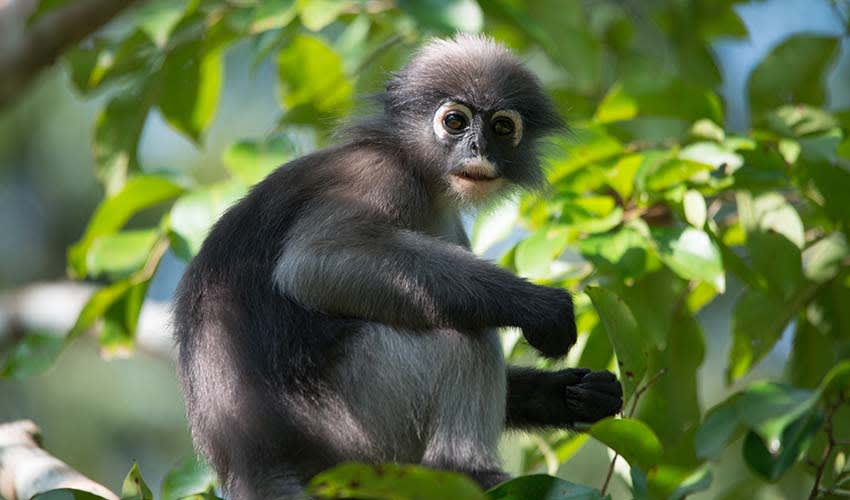Native to the forests of Malaysia, southern Thailand, and parts of Myanmar, this gentle monkey is instantly recognizable by its dark gray or slate-blue fur, pale white eye rings, and pinkish lips, giving it an adorably expressive, almost cartoonish face. Living high among the treetops of tropical forests, the dusky leaf monkey is a quiet symbol of grace, curiosity, and social harmony in the canopy world.
Unlike many primates that can be loud or aggressive, this species is remarkably calm and tolerant. It lives in small to medium-sized groups, usually composed of one dominant male, several females, and their offspring, often totaling 10 to 15 individuals. Within these groups, cooperation is the norm: mothers often allow other females to help care for their infants, a behavior known as alloparenting. Their days are spent foraging for young leaves, shoots, and fruits, then resting together in the high canopy, grooming one another, and basking in the dappled sunlight.
One of the most captivating traits of the dusky leaf monkey is its dramatic infant coloration. Newborns are not gray like adults but bright orange or golden-yellow, a striking contrast that makes them stand out in the forest canopy. Over the next few months, their fur gradually darkens as they grow, turning into the smoky-gray coat that gives the species its name.
Physically, these monkeys are built for life in the trees. Their long tails—often longer than their bodies—act as counterbalances when they leap between branches, and their slender limbs and flexible joints make them agile climbers. Their diet, composed mainly of leaves, requires a specialized multi-chambered stomach filled with microbes that ferment tough plant matter, much like a cow’s digestive system. This allows them to extract nutrients from fibrous vegetation and thrive in environments where fruit is seasonal or scarce.
Distribution
 Malaysia
Malaysia Myanmar
Myanmar Thailand
ThailandAnything we've missed?
Help us improve this page by suggesting edits. Glory never dies!
Suggest an editGet to know me
Terrestrial / Aquatic
Altricial / Precocial
Polygamous / Monogamous
Dimorphic (size) / Monomorphic
Active: Diurnal / Nocturnal
Social behavior: Solitary / Pack / Troop
Diet: Carnivore / Folivore / Omnivore / Piscivorous / Insectivore
Migratory: Yes / No
Domesticated: Yes / No
Dangerous: Yes / No




